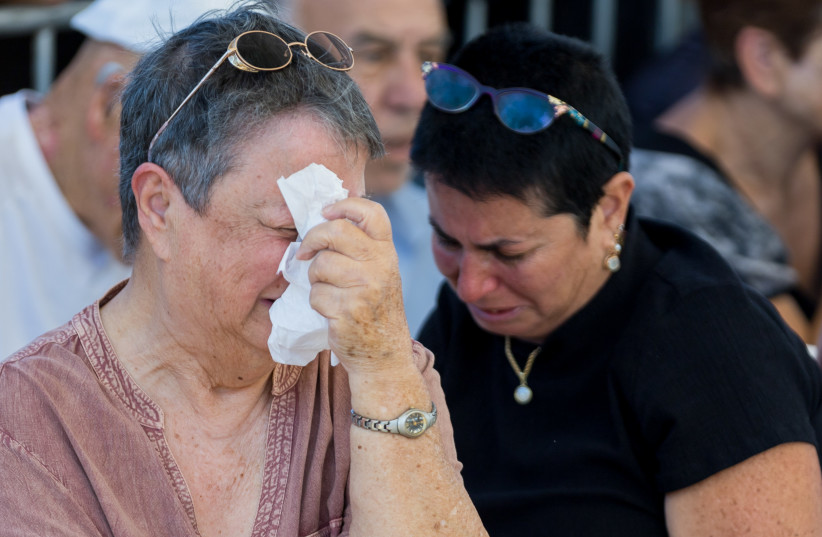It's a gift to be alive, 13-year-old Renana Botzer-Swissa from Kfar Aza told The Jerusalem Post on Tuesday as she recounted her experience from October 7.
Botzer-Swissa's kibbutz was one of the hardest hit in Hamas's massive attack, but luckily for her family, their house was one of the only ones in the neighborhood to remain largely untouched.
But while they were left physically unharmed, many of their neighbors were murdered as was one of Botzer-Swissa's classmates. Three of her friends are still missing, and it's unclear whether they were abducted to Gaza or are among those who were murdered and still unidentified.
For Botzer-Swissa, the nightmare began at 6:22 a.m. on October 7 when she woke up hearing sirens.
"This isn't unusual," she said. "It happens every few months, so we went into the safe room and then we started hearing gunfights. For 16 hours straight, there was non-stop shooting around the house. All we could do was sit in our safe room and pray that no one comes in."

'Are they going to rape me?'
“I wondered if they were going to come into my house, into my bedroom, I didn’t know what they were going to do. Are they going to rape me? Are they going to kidnap me? Are they going to kill me?”
Botzer-Swissa has been interviewing both in Israel and abroad since she was six years old about her experience as a child living near Gaza.
In 2021, during Operation Guardian of the Walls, presenter John Oliver gave a monologue on his show bashing Israel for the conflict and calling it an apartheid state.
Botzer-Swissa responded to the video describing what it's like for her living in Kfar Aza.
"Every siren makes me cry," she told him. "Just so you know, my army is strong, but that does not protect me from fear. Since I was born, I have lived in fear. Since I was six, I have gone to therapy.
"Israel was founded to protect the Jewish nation, and we are not sorry for being a strong country. Our country doesn't attack whenever it wants. However, Hamas has been attacking for 20 years whenever it wants.
"I just want it to end, I just want peace, a normal childhood for me and for all the children in Gaza."
'I just want it to end, I just want peace.'
Botzer-Swissa said she has been giving interviews for more than half her life because she thinks it's important to make the voices of the children living through the rockets and the danger heard around the world.
Right now, she wants the world to know that "Hamas is not a welcoming community or a resistance movement. It's a terrorist organization, and we need to treat it like one.
"I want everyone to know that Israel needs to attack because so many civilians were murdered. You cannot keep talking about proportional response because our soldiers don’t rape women and we don’t kidnap innocent children.”
Botzer-Swissa's family was evacuated to Shfa'im, but the trauma remains. On Tuesday, she heard her first siren since leaving Kfar Aza and she panicked.
“I grabbed my dog and we sprinted down to the safe room and stayed there for some time,” she recounted.
But she has been trying to find ways to deal with what she went through.
“At first the trauma was fresh, and I didn’t know how to cope with it, but I’m trying to get better and talk to therapists. I need to relive the experience to not relive it again every day.”
'I never want to set foot in my kibbutz again.'
But reliving the trauma does not include wanting to go back home. Four years ago, Botzer-Swissa's mother Ilanit told Reuters that she wanted to leave but that Renana loved Kfar Aza and wanted to stay. Her experience on October 7 seems to have changed that.
“I never want to set foot in my kibbutz [again]," she said. "The whole place is filled with trauma and bad memories, and I cannot imagine going back there.”
Since their evacuation, Botzer-Swissa said she has seen the opposite side of what she experienced on October 7.
“When we were in Kfar Aza, we saw the most awful part of humanity, but when we got here, we saw the best part of everyone," she said. "Everyone who could came and donated food and clothes and everything you could think of. We saw the best side of the Israeli people.”
The Jerusalem Post and OneFamily are working together to help support the victims of the Hamas massacre and the soldiers of Israel who have been drafted to ensure that it never happens again.
Become a partner in this project by donating to OneFamily >>
